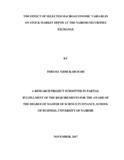| dc.contributor.author | Karubari, Teresia N | |
| dc.date.accessioned | 2017-12-13T05:20:51Z | |
| dc.date.available | 2017-12-13T05:20:51Z | |
| dc.date.issued | 2017 | |
| dc.identifier.uri | http://hdl.handle.net/11295/101777 | |
| dc.description.abstract | The stock market is used to measure both the performance and economic stability of a nation. The rising stock market index is a sign of a growing economy and a declining and fluctuating stock market portrays economic instability. Both theory and empirical literatures hold that a country’s growth is directly linked to the size of the economy, which consists of a number of variables, Inflation, Interest rate and GDP. This study sought to determine the effect of selected macroeconomics variables on the stock market depth of Nairobi Securities Exchange. The independent variables were interest rates as measured by average monthly lending rates, economic growth as measured by monthly GDP and inflation as measured by monthly CPI. Stock market depth was the dependent variable which the study sought to explain and it was measured by monthly value of stocks traded in the stock market. The study employed a descriptive cross-sectional design and carried out a census of all the 66 firms listed at the NSE. The study revealed that economic growth, interest rates and inflation rates in Kenya had been fluctuating during the study period (2007-2016). Regression analysis findings established that there was a strong relationship (R= 0.658) between selected macroeconomics variables and stock market depth. The result of the study also indicated that the value of R-squared is 0.418. This means that independent variables investigated in the study (Economic Growth, Interest Rates and Inflation Rate) could account for or explain only 41.8% of the dependent variable. The remaining 58.2% can be explained by other variables which were not the subject of this study. The study concludes that there is a strong relationship between the selected macroeconomic variables and stock market depth. The study also established that economic growth positively affects stock market depth while inflation rate and interest rate had a negative effect. The study recommends that the Capital market Authority and the national government of Kenya should come up with fiscal policies aimed at cushioning the stock market from high inflationary pressure. The study further established that factors such as political instability, global financial crisis and international fuel prices negatively affects economic growth and leads to increased cost of living which in turn affects the stock market depth. The study recommended that the government should put in place mechanisms aimed at enhancing political and economic stability as a way of enhancing economic growth which in turn promotes development of the stock market. | en_US |
| dc.language.iso | en | en_US |
| dc.publisher | University Of Nairobi | en_US |
| dc.rights | Attribution-NonCommercial-NoDerivs 3.0 United States | * |
| dc.rights.uri | http://creativecommons.org/licenses/by-nc-nd/3.0/us/ | * |
| dc.subject | The Nairobi Securities Exchange | en_US |
| dc.title | The Effect of Selected Macro-economic Variables on Stock Market Depth at the Nairobi Securities Exchange | en_US |
| dc.type | Thesis | en_US |



